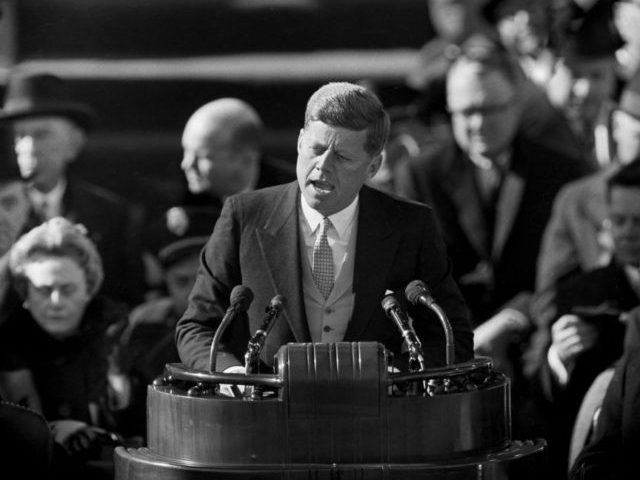Memorial Day marks the 100th birthday of John F. Kennedy.
Cast as a liberal martyr, the 35th president actually left a legacy for conservatives to cheer.
Murdered by a communist, liberals spent the better part of the last 54 years blaming Dallas oil men, shadowy CIA operatives, and the John Birch Society for his death. Kennedy’s assassin perhaps understood him better than many of his mourners.
As his actions during the Cuban Missile Crisis, in planning the ill-fated Bay of Pigs invasion, and in sending “advisors” to Vietnam show, President Kennedy took a hardline stance against Communism. His personal relationship with the most reviled anti-Communist perhaps demonstrates this to a greater degree. Bobby Kennedy worked for Joe McCarthy. Sisters Eunice and Pat dated brother John’s Senate colleague. Niece Kathleen Kennedy Townsend was the godchild of McCarthy. When the Senate condemned the Republican in the wake of the Army-McCarthy hearings the Democrat from Massachusetts ducked the vote and years later abruptly left a Harvard dinner in disgust when a speaker compared traitor Alger Hiss to the former guest at his family’s Hyannis compound.
The Kennedy tax cuts, passed by the House shortly before his death and posthumously in the Senate, slashed top rates from 91 percent to 70 percent. He increased defense spending. He called abortion “repugnant” and appointed Byron White, one of the two justices who dissented on Roe v. Wade, to the Supreme Court.
Kennedy, at least when he ran for president, embraced the “liberal” label. Some of his policies reflected this.
JFK increased domestic spending. He bullied the steel industry into accepting a price control of sorts. He proposed a proto-Medicaid program that failed to pass.
Other positions appear neither Left nor Right but clearly problematic for those in the Democratic Party today.
The Kennedy Administration embarked upon a campaign of dubious surveillance of Martin Luther King. Though the president’s brother Bobby oversaw the Justice Department, Camelot’s camp followers absolve the administration of indecency by characterizing the civil-liberties invasion as the fault of J. Edgar Hoover rather than his two bosses with the same famous last name. With the support of his brother Ted, who later reversed this position during the George W. Bush Administration, President Kennedy used wiretaps without warrants legitimizing them. His grandiose view of the power of the presidency compelled him to unwisely and unethically support a coup that led to the assassination of American ally Ngo Dinh Diem, president of South Vietnam.
John F. Kennedy served as president for less than three years. The brevity of his time in office ultimately led observers to project their wishes upon his policies. Today, more than a half century after his death on the 100th anniversary of his birth, politicos Left and Right continue to cite Kennedy to justify their favored positions. But his policies do not fit neatly into ideological boxes no matter how hard partisans push.
Liberals imagine away his friendship with McCarthy and his hectoring of MLK, invent fantastical conspiracy theories to escape the fact that “some silly little communist,” as his widow put it, killed him, and construct a counterfactual history of the sixties that sees the president who escalated American involvement in Vietnam ending it had a disgraced Marine marksman missed his mark. Conservatives similarly airbrush out complicating facts in a narrative that stresses his tax cutting, defense spending, and heartfelt contempt for Communism. The same bullet that killed a man birthed a symbol.
Conservatives can offer a “hip hip hooray,” perhaps even two, for John F. Kennedy on his 100th birthday. Too much prevents them from offering a full-throated three cheers.

COMMENTS
Please let us know if you're having issues with commenting.